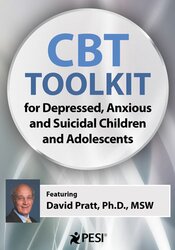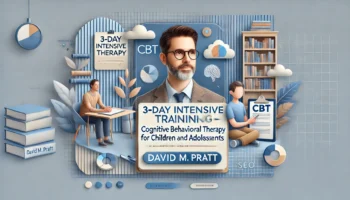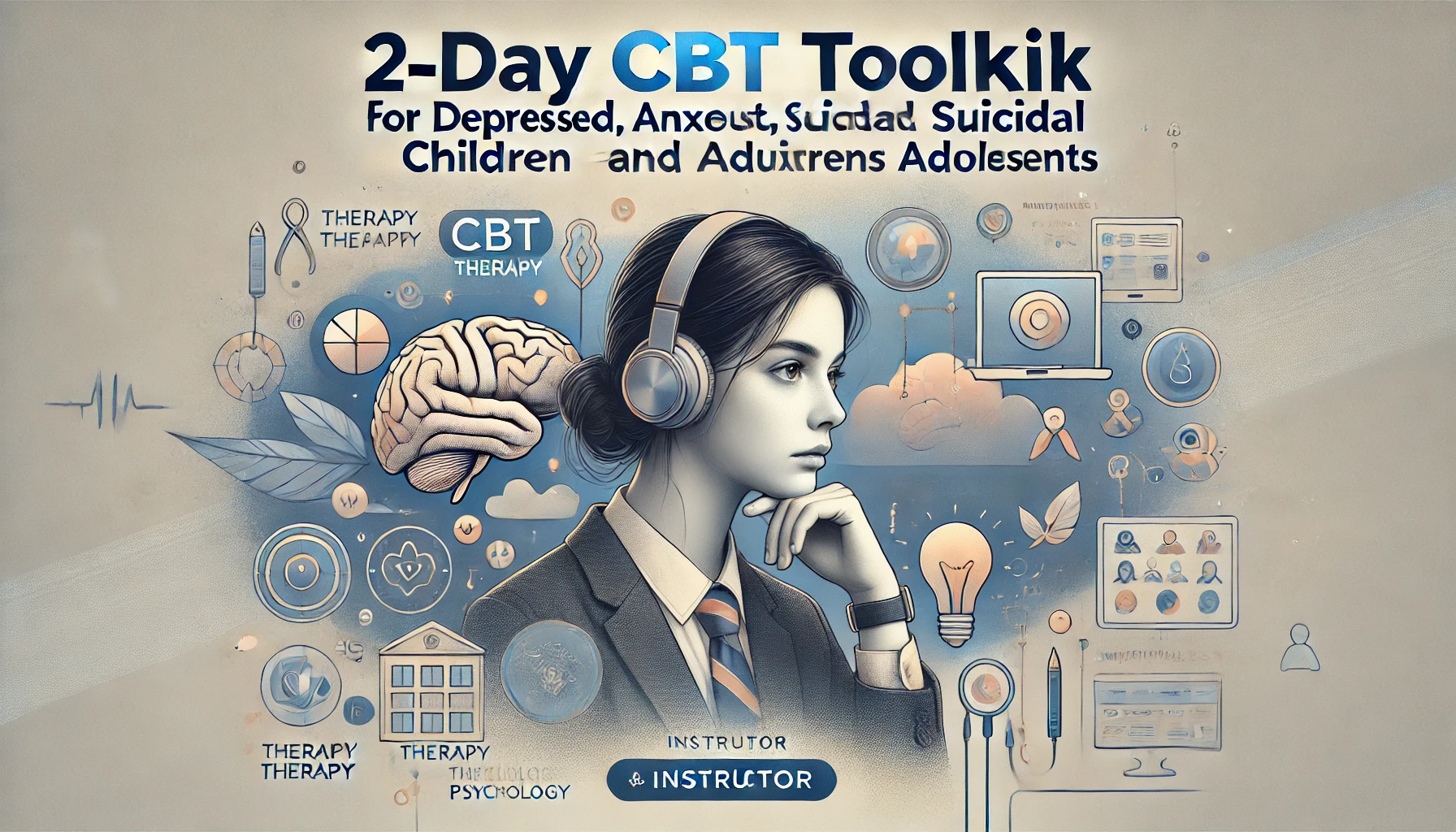2-Day -CBT Toolkit for Depressed, Anxious and Suicidal Children and Adolescents – David M. Pratt
2-Day -CBT Toolkit for Depressed, Anxious and Suicidal Children and Adolescents – David M. Pratt has the same quality as the author’s salapage.
Overview
Discover the Best Learning with 2-Day -CBT Toolkit for Depressed, Anxious and Suicidal Children and Adolescents – David M. Pratt
WisMentor is your ultimate destination for online learning. Explore "2-Day -CBT Toolkit for Depressed, Anxious and Suicidal Children and Adolescents – David M. Pratt" by top authors and instructors, designed to transform your skills and career. Start now and unlock your potential!
Salepage check: 2-Day -CBT Toolkit for Depressed, Anxious and Suicidal Children and Adolescents
Author: David M. Pratt
- Faculty:
- David M. Pratt
- Duration:
- 11 Hours 31 Minutes
- Format:
- Audio and Video
- Copyright:
- Apr 23, 2020
Description
“I know that it can be difficult to engage children and adolescents in the treatment process. These kids are often very “reluctant doers”. Reaching this population and engaging them in meaningful therapy is quite a challenge indeed. To improve treatment, I developed my own structured therapeutic activities and wasn’t sure what was going to happen when my co-therapist and I introduced them, but we thought it was worth a try. We were surprised, and relieved, to see kids responding so well. They came to group, participated in the activities, and began to self-disclose intimate details of their lives and struggles. By using the evidence-based, structured, therapeutic activities outlined in this program, you can present treatment in a more relatable manner and help kids learn practical skills to manage depression, anxiety, and self-harm or suicidal urges.”
David M. Pratt, Ph.D., MSW
This training parallels Dr. Pratt’s recently published book, CBT Toolkit for Depressed, Anxious and Suicidal Children and Adolescents (PESI, 2019) and brings to life over 100 structured therapeutic activities you can readily use. Don’t miss this opportunity to enhance your clinical skills and provide the high-quality treatment children and adolescents both need and deserve.
Handouts
| Manual – 2-Day CBT Toolkit for Depressed, Anxious and Suicidal Children and Adolescents (2.9 MB) | 117 Pages | Available after Purchase | |
| Illinois Educators Self-study Instructions (28.5 KB) | Available after Purchase | ||
| Illinois Educators Evaluation Form (1.2 MB) | Available after Purchase |
Outline
Therapist Guidelines: Keys to Success
- Psychoeducation: Knowledge is power
- Therapy tips: Anxiety and depression
- Introducing CBT to the client and parents
- Limitations of the research and potential risks
Goal Setting and Motivational Counseling: Are You and Your Client Working Together?
- Why goals are important
- SMART goals
- Assessing the consequences of anxiety and depression
- Pros and cons analysis
Mindfulness: Calming the Emotional Brain to Utilize the Rational Mind
- Amygdala hijack & the neuroscience of stress
- The effects of adrenalin & cortisol on the body
- Mindfulness meditation & brain functioning
- Typical stress response vs. desired stress response
- Mindfulness skills for children & adolescents
- Mindfulness practice & monitoring
Mood Monitoring: How to Help Kids Be Aware of Their Feelings
- Feeling awareness games
- Feelings and trigger situations
- Subjective units of distress scale (SUDS)
- Daily and weekly mood monitoring
Behavioral Activation: Let’s Get Active Again!
- The CBT paradigm: Behavioral activation and depression
- Behavior monitoring: Typical school & weekend day
- Life values and activities
- Identifying and covercoming barriers to healthy activities
- Conduct a behavioral activation experiment
Cognitive Processing: Helping Kids Tune into Their Thoughts
- The CBT paradigm and why thoughts are important
- Different types of stinking thinking
- Identify positive, realistic thoughts
- Identifying & monitoring my stinking thinking
Cognitive Restructuring: Staying Positive Despite Challenges
- Define cognitive restructuring
- Ambiguous situations…What’s really going on?
- Positive Psychology tools to fight depression
Social Skills Training: Teaching Essential Social Skills
- Teaching effective problem solving
- Appropriately using assertiveness
- Effective communication skills
- Practice non-verbal communication
- Conversation and “chit-chat” skills
Anxiety Treatment & Exposure Therapy: Helping Clients Face Their Fears
- Somatic management skills
- Create an anxiety hierarchy
- Identifying & correcting “catastrophic” stinking thinking
- Social skills to help manage anxiety
- Develop a “Game Plan” to help face anxiety
- Imagino Exposure
- In-Vivo Exposure
Special Topics in Treating Anxiety: Applying Exposure Therapy to Specific Anxiety Problems
- Social Anxiety
- Separation Anxiety
- Generalized Anxiety Disorder and chronic worry
- Somatic Symptom Disorder
Manage Self-Harm and Suicidal Urges: Evidence-Based Practices to Prevent Suicide and Self Harm
- Conduct an evidence-based suicide risk assessment
- Develop an evidence-based suicide prevention plan
- Use behavioral chain analysis to prevent future self-harm
- Create a hope box
- Emotional distress tolerance skills to resist self-harm urges
- Future time imaging
- Using acceptance and commitment to improve happiness
- Problem-solving in a crisis
- CBT “coping card” for self-harm prevention
Parent Involvement: Parents are Your Clients Too!
- Parent involvement in the evaluation process and treatment plan
- Confidentiality considerations
- Family behavioral activation, problem solving, & contracts
- Parent support & stress management
Faculty

David M. Pratt, Ph.D., MSW Related seminars and products: 6
Western New York Psychotherapy Services
David M. Pratt, Ph.D., MSW, is in private practice and Director of the Mood Management Program at the Western New York Psychotherapy Services in Amherst, NY. He is presently on faculty with the University at Buffalo, School of Social Work, Office of Continuing Education, and a member of New York State, Office of Mental Health Advisory Board on Evidence-Based Treatments for Youth. He was the Principal Psychologist at the Western New York Children’s Psychiatric Center, Clinical Assistant Professor of Psychiatry at the University at Buffalo and Adjunct Professor/Lecturer, University at Buffalo Counseling, School and Educational Psychology department.
Dr. Pratt has conducted numerous trainings/workshops in Cognitive Behavioral Therapy at local, state, national, and international forums. He is well regarded as an engaging trainer who emphasizes practical skill development.
Speaker Disclosures:
Financial: David Pratt is in private practice. He receives a speaking honorarium from PESI, Inc.
Non-financial: David Pratt has no relevant non-financial relationship to disclose.
About 2-Day -CBT Toolkit for Depressed, Anxious and Suicidal Children and Adolescents – David M. Pratt and Our Expert Authors
2-Day -CBT Toolkit for Depressed, Anxious and Suicidal Children and Adolescents – David M. Pratt is part of our extensive collection of over 70,000 premium courses at WisMentor. Created by renowned authors and industry leaders, this course is tailored to provide cutting-edge knowledge and actionable insights.
Why Choose WisMentor?
- 🌟 Access courses from world-renowned authors.
- 📚 Wide range of topics to suit your professional and personal growth needs.
- 💼 Lifetime access and flexible learning options.
Key Features of 2-Day -CBT Toolkit for Depressed, Anxious and Suicidal Children and Adolescents – David M. Pratt:
- ✅ Comprehensive content covering essential topics.
- ✅ Evidence-based methodologies and practical examples.
- ✅ Learn at your own pace with expert guidance.
How to Access Your Course?
Getting started is easy:
- 📩 Receive an instant download link via email.
- 🌐 Access your course anytime through your account dashboard.
- 📱 Compatible with all devices for a seamless experience.
Need Help?
Our dedicated support team is here to assist you. Visit our Contact Us page or reach out via email for any queries or assistance.
More from Our Collection:
Don’t miss the opportunity to explore more courses from top authors and enrich your learning journey at WisMentor. Find your next course now and take your skills to the next level.
Curriculum
FAQs
Requirements
- Technical Needs: Access to a computer or device capable of viewing course materials and participating in any interactive components.
- Professional Experience: Ideal for mental health professionals, including psychologists, counselors, social workers, and therapists, who work with children and adolescents.
- Educational Background: Participants should possess a foundational understanding of psychology or counseling principles.
Features
- Expert Instruction: Led by experienced clinicians and educators with decades of experience working with children and adolescents.
- Interactive Learning Modules: Engaging sessions that combine theoretical knowledge with practical application through case studies and role-playing.
- Evidence-Based Techniques: Utilizes proven methods to address trauma, ADHD, autism, anxiety, depression, and conduct disorders in children and adolescents.
- Comprehensive CBT Strategies: The course offers over 220 practical worksheets and therapist tips designed to manage moods, build positive coping skills, and develop resiliency in young clients.
Target audiences
- Graduate Students: Individuals pursuing advanced degrees in psychology, counseling, or related fields who wish to specialize in youth mental health.
- Clinical Social Workers: Social workers involved in child and adolescent mental health services.
- Educational Counselors: School counselors aiming to support students dealing with depression, anxiety, or suicidal tendencies.
- Mental Health Practitioners: Professionals seeking specialized training in Cognitive Behavioral Therapy (CBT) techniques for young clients.



